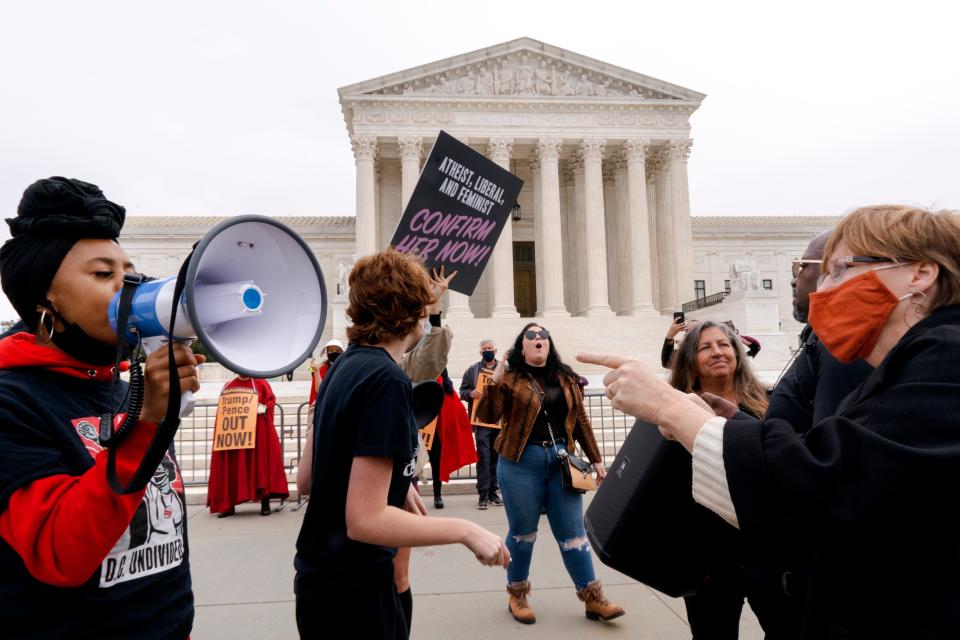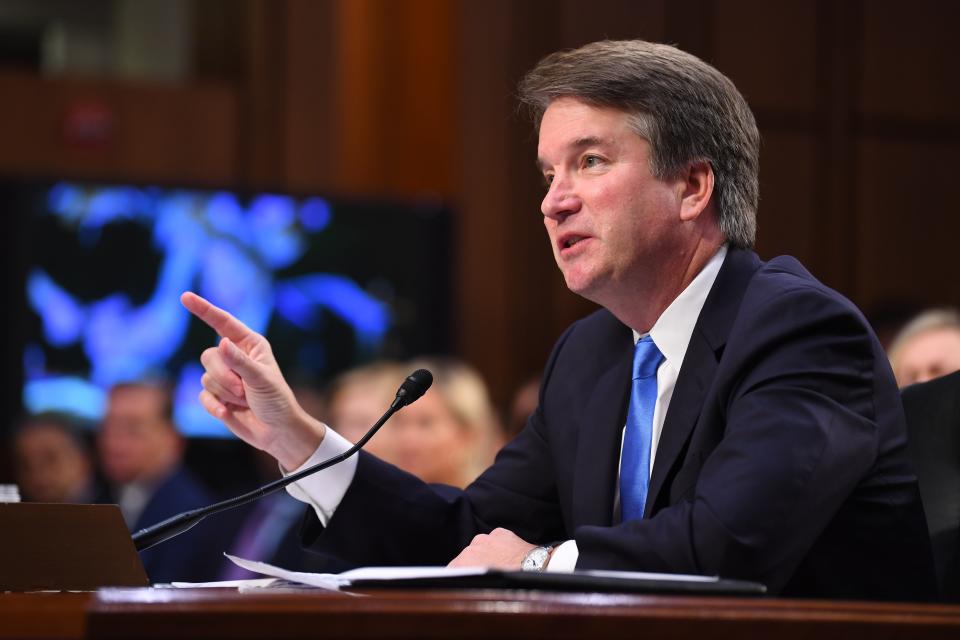New Associate Justice Amy Coney Barrett could have immediate impact on American democracy

WASHINGTON – Few Supreme Court justices have reached the nation's highest bench with as much immediate potential to influence American democracy as Associate Justice Amy Coney Barrett.
Upon taking her judicial oath from Chief Justice John Roberts on Tuesday, Barrett became the person who could tip the balance on challenges to state election procedures that could determine who wins the White House and control of Congress a week later.
She became the potential deciding vote in a case the court will hear early next month that threatens health care for millions of Americans, including those with limited incomes and pre-existing conditions.
She became the potential deciding vote in a case the justices will hear the day after the election that will determine the rights of religious believers to be exempt from laws protecting the LGBTQ community.
More: Barrett takes oath as Supreme Court justice, as GOP celebrates 6-3 conservative majority
She became someone who could determine whether the high court delves quickly into issues ranging from abortion rights and immigration policies to President Donald Trump's tax returns, foreign entanglements and Twitter followers.
More: Pack the court? Battles between Republicans and Democrats fuel clash over Supreme Court's future
It won't take long for Republicans to learn if the 48-year-old Hoosier, a Notre Dame Law School professor who served three years as a federal appeals court judge, is the reliable conservative upon whom they raced to bestow a lifetime seat on the high court before Election Day. Democrats will know soon enough if she appears beholden to the president and unwilling to vote against his political or personal interests.
More: Six conservative justices? 10 ways the Supreme Court could change

Barrett kept her intentions, as well as most of her opinions, to herself during three days of testimony before the Senate Judiciary Committee. She refused to be baited by Democrats into declaring her views on issues that could come before the court, which is customary, or even on civic norms such as whether a president who loses reelection should commit to a peaceful transfer of power.
Most notably, she refused to say whether she would recuse herself from cases involving the presidential election, given Trump's expressed desire to have her participate.
More: Supreme Court rules Wisconsin mail-in ballots must be received by Nov. 3
"I certainly hope that all members of the committee have more confidence in my integrity than to think that I would allow myself to be used as a pawn to decide the election for the American people," she said.
Since April, the high court has been asked to intervene in state election disputes that affect who can vote, where, when and how. With the presidential election a week away, the justices are mulling challenges from Pennsylvania and North Carolina, two key battleground states, that could influence the race.
In the Pennsylvania case, the court deadlocked 4-4 last week on whether absentee ballots can be received up to three days beyond Election Day. That action left in place a state court's ruling allowing the extension, but Republican opponents returned to the Supreme Court this week seeking a new decision with Barrett's input.
Beyond the spate of voting rights cases, it's possible that the results of the election will be challenged, particularly because of the pandemic-fueled growth of mail-in ballots. That could mean more cases coming to the Supreme Court after Election Day.
During the final debate on Barrett's confirmation Monday, Sen. Chris Coons, D-Del., accused Trump of wanting her to "'look at the ballots,' as he has said, and hand him the election."
From ACA to LGBTQ

Barrett also could have an immediate influence on major cases scheduled to be heard this year and decided in 2021. Tops among them is the latest challenge to the Affordable Care Act, which the court upheld in 2012 and 2015.
The justices will hear a challenge Nov. 10 brought by Texas and other "red" states, with the Trump administration's backing, that would strike down the law because Congress in 2017 eliminated the tax used as a penalty against consumers who do not buy health insurance. The central question is whether that provision can be severed while leaving the rest of the law intact.
Barrett told the Judiciary Committee that her prior criticisms of the court's rulings upholding the law do not apply to the case set for oral argument next month. Asked if she would recuse herself from the case, she said it’s “a legal issue” that she would discuss with her colleagues.
"I'm not here on a mission to destroy the Affordable Care Act," she said. As for whether she was questioned before her nomination on how she would rule in the upcoming case, she said, “I was never asked, and if I had been, that would have been a short conversation.”
More: Health care law faces another Supreme Court showdown, this time without Justice Ginsburg's vote
Before that case is heard, the high court will hold oral argument the day after the election in another major case pitting LGBTQ rights against religious liberty. The case was brought by a Catholic social services agency excluded from Philadelphia's foster care program because it will not place children with same-sex couples.
Barrett has given lectures to Alliance Defending Freedom, which defends religious freedom in cases affecting LGBTQ rights. Twenty-seven LGBTQ organizations opposed her confirmation in 2017 to the U.S. Court of Appeals for the 7th Circuit.
More: Amy Coney Barrett was trustee at private school with anti-gay policies
As the Supreme Court's term goes forward, the justices are scheduled to hear several cases involving Trump personally and politically. They will decide soon whether to hear his second attempt to keep his tax returns and financial records from New York City prosecutors.
More: Supreme Court says President Trump cannot keep tax, financial records from prosecutors
Already on their docket are cases involving Trump's border wall, asylum policies and effort to exclude undocumented immigrants from census calculations used to apportion seats in the House of Representatives.
And as soon as Friday, the justices could choose to hear an explosive abortion rights case from Mississippi that would ban most abortions after 15 weeks of pregnancy.
“I have made no commitment to anyone, not in the Senate, not over at the White House, about how I would decide any case,” Barrett said in her confirmation hearing.
Trial by fire

Barrett's trial by fire will make those faced by Trump's first two nominees pale by comparison, even though both came to the court in the midst of previous Supreme Court terms.
More: Supreme Court Justices Gorsuch, Kavanaugh display independent streaks
Neil Gorsuch had been an associate justice for just 11 weeks in 2017 when he made that clear in a single day.
When the court struck down an Arkansas law that treated same-sex couples differently from opposite-sex couples on their children's birth certificates, he dissented. When it refused to consider a challenge to the Department of Veterans Affairs' system for evaluating disability claims, he dissented. When it declined to hear a challenge to a California law limiting who can carry a concealed gun in public, he dissented again.
And when the court ruled that a Missouri church can receive public funds for playground resurfacing, he said religious discrimination is unconstitutional "on the playground or anywhere else."
A year later, Brett Kavanaugh didn't take long to show he would cast himself more in the mold of Chief Justice John Roberts, who has emerged as the swing vote on the court. But in nearly all the court's most controversial cases – abortion, immigration, gay rights, voting rights – he has voted with the conservative bloc.
This article originally appeared on USA TODAY: Amy Coney Barrett: Elections, health care, abortion await new justice